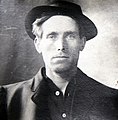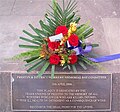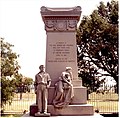Portal:Organized Labour

Introduction

- In trade unions, workers campaign for higher wages, better working conditions and fair treatment from their employers, and through the implementation of labour laws, from their governments. They do this through collective bargaining, sectoral bargaining, and when needed, strike action. In some countries, co-determination gives representatives of workers seats on the board of directors of their employers.
- Political parties representing the interests of workers campaign for labour rights, social security and the welfare state. They are usually called a labour party (in English-speaking countries), a social democratic party (in Germanic and Slavic countries), a socialist party (in Romance countries), or sometimes a workers' party.
- Though historically less prominent, the cooperative movement campaigns to replace capitalist ownership of the economy with worker cooperatives, consumer cooperatives, and other types of cooperative ownership. This is related to the concept of economic democracy.
The labour movement developed as a response to capitalism and the Industrial Revolution of the late 18th and early 19th centuries, at about the same time as socialism. The early goals of the movement were the right to unionise, the right to vote, democracy, safe working conditions and the 40-hour week. As these were achieved in many of the advanced economies of western Europe and north America in the early decades of the 20th century, the labour movement expanded to issues of welfare and social insurance, wealth distribution and income distribution, public services like health care and education, social housing and common ownership. (Full article...)
Selected article
International Workers' Day, also known as Labour Day in some countries and often referred to as May Day, is a celebration of labourers and the working classes that is promoted by the international labour movement and occurs every year on 1 May, or the first Monday in May.
Traditionally, 1 May is the date of the European spring festival of May Day. The International Workers Congress held in Paris in 1889 established the Second International for labor, socialist, and Marxist parties. It adopted a resolution for a "great international demonstration" in support of working-class demands for the eight-hour day. The 1 May date was chosen by the American Federation of Labor to commemorate a general strike in the United States, which had begun on 1 May 1886 and culminated in the Haymarket affair four days later. The demonstration subsequently became a yearly event. The 1904 Sixth Conference of the Second International, called on "all Social Democratic Party organisations and trade unions of all countries to demonstrate energetically on the First of May for the legal establishment of the eight-hour day, for the class demands of the proletariat, and for universal peace".
The 1st of May, or first Monday in May, is a national public holiday in many countries, in most cases known as "International Workers' Day" or a similar name. Some countries celebrate a Labour Day on other dates significant to them, such as the United States and Canada, which celebrate Labor Day on the first Monday of September. In 1955, the Catholic Church dedicated 1 May to "Saint Joseph the Worker". Saint Joseph is the patron saint of workers and craftsmen, among others. (Full article...)
February in Labor History
Significant dates in labour history.
- February 01 – The Paterson silk strike of 1913 began in the U.S.; the San Diego free speech fight began in the U.S. in 1912
- February 02 – Shannon J. Wall died
- February 03 – George Becker died; José Vitoriano died
- February 04 – Bill Haywood was born; John Mitchell was born; Benyoucef Benkhedda died
- February 05 – Neil Aggett died; Ludvik Buland died
- February 06 – The Seattle General Strike of 1919 began in the U.S.; Elba Esther Gordillo was born; William Hutcheson was born
- February 07 – The Cripple Creek miners' strike of 1894 began in the U.S.; the 2006 labour protests in France began; Paul Mattick died
- February 08 – Ong Teng Cheong died; Jakob Kaiser was born
- February 09 – George Lippard died; the Supreme Court of Canada issued its reasoning in Ontario Human Rights Commission v. Etobicoke
- February 10 – 11 strikers were killed during the Reesor Siding Strike of 1963 in Canada; Peter Smith died; the Building and Construction Trades Department, AFL-CIO was founded; the film Blue Collar was released
- February 11 – The Oxnard strike of 1903 began in the U.S.; the UAW won a first contract at GM, ending the Flint sit-down strike; Nellie Quander was born; Mark Hewitson died; Clyde Cameron was born; the Memphis sanitation strike began
- February 12 – John L. Lewis was born
- February 13 – The Sons of Vulcan win the first contract in the U.S. iron and steel industry and the first union contract of any kind in American history; Margaretta Scott was born; Dennis McDermott died; John Healey was born
- February 14 – The Asbestos Strike began in 1949 in Australia; the Winter of Discontent ended in the U.K. in 1979; Jimmy Hoffa was born; Michael Sacco was born; the Confederation of State and Municipal Employees of Iceland was founded; Mary Lee was born
- February 15 – The 1951 New Zealand waterfront dispute began; Baldemar Velasquez was born; Alice Henry died
- February 16 – The Griviţa Strike of 1933 began in Romania in 1933; William Quesse died; the National Hockey League cancelled its season in the middle of the 2004-05 NHL lockout; James Orange died;
- February 17 – Harry Van Arsdale, Jr. died
- February 18 – Peter J. McGuire died; George Campbell was born
- February 19 – The U.S. Supreme Court decided Garcia v. San Antonio Metropolitan Transit Authority and NLRB v. J. Weingarten, Inc.; I. C. Frimu died
- February 20 – Chittabrata Majumdar died
- February 21 – Patrick J. Campbell died; Phil Hare was born; Felix Aylmer was born
- February 22 – Albert Shanker died; David Dubinsky was born; the Democratic Organization of African Workers' Trade Union was founded; Poncke Princen died
- February 23 – Douglas Fraser died; Graduate Employees Together – University of Pennsylvania was formed; John Holman died; Kate Barnard died; Benyoucef Benkhedda was born; the Marine Engineers' Beneficial Association was founded
- February 24 – The General Union of Algerian Workers was founded; the U.S. Supreme Court decided Muller v. Oregon; John P. Frey was born; Marshall W. Mason was born
- February 25 – Edgar Nixon died; Las Aguas Bajan Turbias, an Argentine film about workers forming a trade union, debuted in the U.S.
- February 26 – John Holman was born; the Southern California supermarket strike of 2003–04 ended in the U.S.; Frederick Hayday died
- February 27 – The Labour Party was founded in the U.K. in 1909; Mark Hewitson died; the first Spanish Trade Union Organisation congress was held; the European Court of Human Rights decided ASLEF v. United Kingdom; Tom Williamson, Baron Williamson died
- February 28 – The University of Miami 2006 custodial workers' strike began in the U.S.; John White was born; Hal C. Banks was born; Lim Chin Siong was born; John La Rose died; Tommy Lewis died; Ted Theodore died; Arthur Hayday died
- February 29 – A. L. Lloyd was born
More Did you know (auto-generated)
- ... that labor lawyer Dick Moss argued the 1975 case which resulted in the establishment of free agency in Major League Baseball?
- ... that 55,000 Berlin workers went on strike on 28 June 1916 to protest the arrest and trial of anti-war campaigner Karl Liebknecht?
- ... that the day after returning to Atlanta following his Nobel Peace Prize acceptance in 1964, Martin Luther King Jr. joined picketers who were on strike against Scripto?
- ... that Sting wrote "We Work the Black Seam" because he felt that "the case for coal was never put to the nation" during the 1984–85 British miners' strike, which began 40 years ago today?
- ... that Russian pianist Pavel Kushnir died on a hunger strike after his arrest for anti-war videos posted on a YouTube channel with five subscribers?
- ... that up to 129,000 Canadian federal workers went on strike?
Related Portals
Selected image
Selected Quote
"The important role of union organizations must be admitted: their object is the representation of the various categories of workers, their lawful collaboration in the economic advance of society, and the development of the sense of their responsibility for the realization of the common good."
|
— Pope Paul VI. |
Did you know
- ...that at the 1974 Coalition of Labor Union Women convention, Myra Wolfgang declared "...there are 3,000 women in Chicago and they didn't come here to swap recipes!"?
- ...that during the Spanish Civil War, Solidaridad Obrera, published by an anarchist labor union, was Spain's highest-circulation newspaper?
- ...that the steel strike of 1959 led to significant importation of foreign steel for the first time in United States history?
Topics
Get involved
Also see our sister WikiProject, Housing and Tenant Rights!
Associated Wikimedia
The following Wikimedia Foundation sister projects provide more on this subject:
-
Commons
Free media repository -
Wikibooks
Free textbooks and manuals -
Wikidata
Free knowledge base -
Wikinews
Free-content news -
Wikiquote
Collection of quotations -
Wikisource
Free-content library -
Wikiversity
Free learning tools -
Wiktionary
Dictionary and thesaurus
















































































